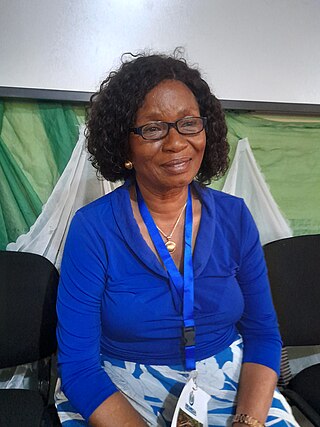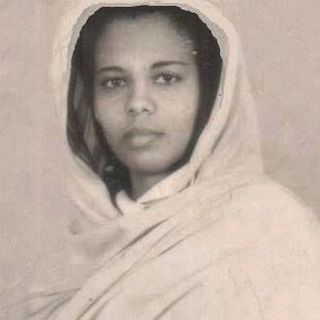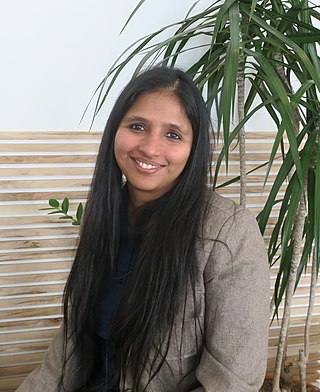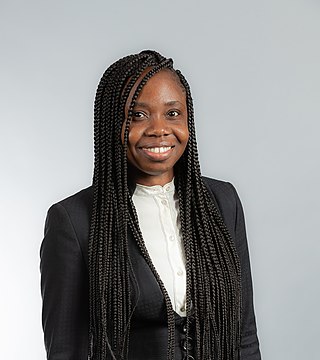Related Research Articles

The University of Khartoum is a public university located in Khartoum, Sudan. It is the largest and oldest university in Sudan. UofK was founded as Gordon Memorial College in 1902 and established in 1956 when Sudan gained independence. Since that date, the University of Khartoum has been recognized as a top university and a high-ranked academic institution in Sudan and Africa.

Sudan University of Science and Technology is one of the largest public universities in Sudan, with ten campuses in Khartoum state. The main campus is located in the so-called Al Mugran area of Khartoum, the confluence of the White Nile and the Blue Nile.

The presence of women in science spans the earliest times of the history of science wherein they have made significant contributions. Historians with an interest in gender and science have researched the scientific endeavors and accomplishments of women, the barriers they have faced, and the strategies implemented to have their work peer-reviewed and accepted in major scientific journals and other publications. The historical, critical, and sociological study of these issues has become an academic discipline in its own right.

Leila Fuad Aboulela is a fiction writer, essayist, and playwright of Sudanese origin based in Aberdeen, Scotland. She grew up in Khartoum, Sudan, and moved to Scotland in 1990 where she began her literary career. Until 2023, Aboulela has published six novels and several short stories, which have been translated into fifteen languages. Her most popular novels, Minaret (2005) and The Translator (1999) both feature the stories of Muslim women in the UK and were longlisted for the International Dublin Literary Award and Orange Prize. Aboulela's works have been included in publications such as Harper's Magazine, Granta, The Washington Post and The Guardian. BBC Radio has adapted her work extensively and broadcast a number of her plays, including The Insider, The Mystic Life and the historical drama The Lion of Chechnya. The five-part radio serialization of her 1999 novel The Translator was short-listed for the Race In the Media Award (RIMA).
Amanda Susan Barnard is an Australian theoretical physicist working in predicting the real world behavior of nanoparticles using analytical models and supercomputer simulations and applied machine learning. Barnard is a pioneer in the thermodynamic cartography of nanomaterials, creating nanoscale phase diagrams relevant to different environmental conditions, and relating these to structure/property maps. Her current research involves developing and applying statistical methods and machine/deep learning in nanoscience and nanotechnology, and materials and molecular informatics. In 2014 she became the first person in the southern hemisphere, and the first woman, to win the Feynman Prize in Nanotechnology, which she won for her work on diamond nanoparticles.

Mohamed Hag Ali Hag el HassanOMRI GCONMC FAAS FIAS FTWAS is a Sudanese-Italian mathematician and physicist who co-founded numerous scientific councils. He is the President of The World Academy of Sciences and Sudanese National Academy of Sciences.

Francisca Nneka Okeke is a Nigerian physicist. She is a Professor of Physics at the University of Nigeria, Nsukka and first female head of a department in the University.
Hadiyah-Nicole Green (1981-) is an American medical physicist, known for the development of a method using laser-activated nanoparticles as a potential cancer treatment. She is one of 66 black women to earn a Ph.D. in physics in the United States between 1973 and 2012, and is the second black woman and the fourth black person ever to earn a doctoral degree in physics from The University of Alabama at Birmingham.

Zeinab Elobeid Yousif, was a Sudanese aircraft engineer. She was the first Sudanese woman to be licensed by the Civil Aviation Authority in the United Kingdom. From July 1973 until May 1992, she worked with Sudan Airways, after which she relocated to the United Kingdom.
Rabia Salihu Sa'id is a Nigerian physicist, professor of atmospheric and space-weather physics, and a researcher at Bayero University Kano. She conducts research in atmospheric and space weather physics, particle physics, and electronics. Sa'id is an advocate and mentor for young women in science with the Visiola Foundation and Peace Corps; she co-founded Nigeria's Association of Women Physicists. She is an advocate and mentor of Science, technology, engineering, and mathematics (STEM) education and is a facilitator for the British Council's Active Citizens' Programme.

The OWSD-Elsevier Foundation Awards for Early-Career Women Scientists in the Developing World are awarded annually to early-career women scientists in selected developing countries in four regions: Latin America and the Caribbean, East and Southeast Asia and the Pacific, Central and South Asia, and Sub-Saharan Africa.

Shohini Ghose is a quantum physicist and Professor of Physics and Computer Science at Wilfrid Laurier University. She has served as the president of the Canadian Association of Physicists (2019-2020), co-editor-in-chief of the Canadian Journal of Physics, and the Director of the Laurier Centre for Women in Science. She was named a 2014 TED Fellow and a 2018 TED Senior Fellow. In 2019 she appeared on the Star TV show TED Talks India Nayi Baat hosted by Shah Rukh Khan. In 2017 she was elected to the Royal Society of Canada's College of New Scholars, Artists and Scientists. Her book Clues to the Cosmos was released in India in December 2019. In 2020, she was selected as an NSERC Chair for Women in Science and Engineering.
Hiba Salah-Eldin Mohamed is a Sudanese molecular biologist who works at the University of Khartoum. She won the 2007 Royal Society Pfizer Award.
María Magdalena González Sánchez is a Mexican astrophysicist, nuclear physicist, researcher, and professor best known for her contributions in gamma ray research and for being the head of the High Altitude Water Cherenkov Experiment (HAWC). She has published 90 articles about her field of study in indexed journals. In 2015 she received the Sor Juana Inés de la Cruz Recognition from the National Autonomous University of Mexico (UNAM).
Asma Abdel Rahim El Dareer is a Sudanese physician known for her research in the 1980s into female genital mutilation. She was one of the first Arab women and feminist doctors to speak out publicly against the practice.

Priscilla Kolibea Mante is a Ghanaian neuropharmacologist, a researcher and lecturer from Kwame Nkrumah University of Science and Technology, currently based at the Kumasi campus. Her research work focuses on alternatives of plant-based therapeutic options to manage drug-resistant epilepsy and the neglected tropical disease neurocysticercosis. In her work, she mostly explores the anticonvulsant activity of the plant alkaloid cryptolepine and its solid-lipid nanoparticles in the management of neurocysticercosis-induced epilepsy. Her goal is to identify a way to help cryptolepine permeate more efficiently into the central nervous system to reduce the risk of convulsion, helping patients to manage their condition as effectively as possible. Aside from her studies of epilepsy, Mante has also worked toward new therapies to alleviate pain, anxiety, and depression.

Gada Kadoda is a Sudanese Engineer and associate professor at Garden City College for Science and Technology. She teaches at the University of Khartoum, where she introduced a course in knowledge management. She has previously served as President of the Sudanese Knowledge Society. She was selected as one of the BBC 100 Women in 2019.
Kwang Hwa Chung is a South Korean physicist who has served as president of the Korea Research Institute of Standards and Science, the Korea Basic Science Institute, and the Korean Vacuum Society. She has received the Moran Medal of the Order of Civil Merit, as well as other honors and awards for her scientific research and work to promote professionalism for women in STEM fields.
References
- 1 2 3 Wren, Kathy (14 February 2015). "Early-Career Women Scientists From Developing Countries Honored at AAAS Annual Meeting". Advance Science, Serving Society. Retrieved 4 July 2015.
- 1 2 Sa’id, Rabia Salihu; Fuwape, Ibiyinka; Dikandé, Alain Moise; Mimouni, Jamal; Hasford, Francis; Haynes, Delia; Gledhill, Igle; Amolo, George; Akin-Ojo, Omololu; Eassa, Nashwa (October 2020). "Physics in Africa". Nature Reviews Physics. 2 (10): 520–523. Bibcode:2020NatRP...2..520S. doi:10.1038/s42254-020-0239-8. ISSN 2522-5820. PMC 7500249 . PMID 33728404.
- 1 2 Bergstedt, Eva. "Honorary doctor from Sudan fighting for women in academia". liu.se. Retrieved 18 November 2024.
- 1 2 3 4 "We need Women in Decision-Making Positions". OWSD. 1 July 2015. Retrieved 18 November 2024.
- ↑ Mwaniki, Joy (1 July 2015). "Five African Female Scientists You Should Definitely Know About". Ayiba Magazine. Archived from the original on 18 October 2018. Retrieved 8 July 2015.
- ↑ "Keynote speakers". 2015 10th International Conference for Internet Technology and Secured Transactions (ICITST). IEEE. December 2015. p. 14. doi:10.1109/icitst.2015.7412040. ISBN 978-1-9083-2052-0.
- ↑ Venton, Danielle (17 February 2015). "Tough As Nails: Female Scientists Rise Up In Nigeria". NPR.
- ↑ "Vietnamese Mathematician Wins Elsevier Foundation Award". Asian Scientist Magazine. 24 February 2015. Retrieved 4 July 2015.
- ↑ "Women Scientists in Developing Countries Receive Elsevier Foundation Awards for Physics and Math". Elsevier. 10 February 2015.
- ↑ "Eassa Nashwa Elected Vice-President | OWSD". owsd.net. Retrieved 1 March 2019.
- ↑ Emam, Reem; Eassa, Nashwa (12 July 2021). "Synthesis, Characterization and Size Evaluation of Biosynthesized Silver Nanoparticles by UV–Vis Spectroscopy". African Journal of Engineering & Technology. 1 (1). doi: 10.47959/AJET.2021.1.1.5 . ISSN 2744-5151.
- ↑ Adam, Ali A.; Elhag, Nihad A. A.; Saeed, Fakhreldeen Abbas; Yagob, Mohamed; Mohamed, Fayha; Eassa, N.; Abdalaziz, Hanaa S.; Ahmed, M. A.; Babiker, Sharief F. (4 July 2021). "An Ensemble Machine Learning Model to Investigate the Screening System for Identification of Potential Patients with COVID-19 in Sudan". 2021 International Congress of Advanced Technology and Engineering (ICOTEN). IEEE. pp. 1–5. doi:10.1109/ICOTEN52080.2021.9493517. ISBN 978-1-6654-1224-7.
- 1 2 Eassa, Nashwa; Elmardi, Maye; Adam, Buthaina; Elgadi, Mayada; Abass, Sara (2015). "Development of Sudanese women in physics". Women in Physics: 5th Iupap International Conference on Women in Physics. AIP Conference Proceedings. 1702 (1): 060040. Bibcode:2015AIPC.1697f0040E. doi:10.1063/1.4937687.